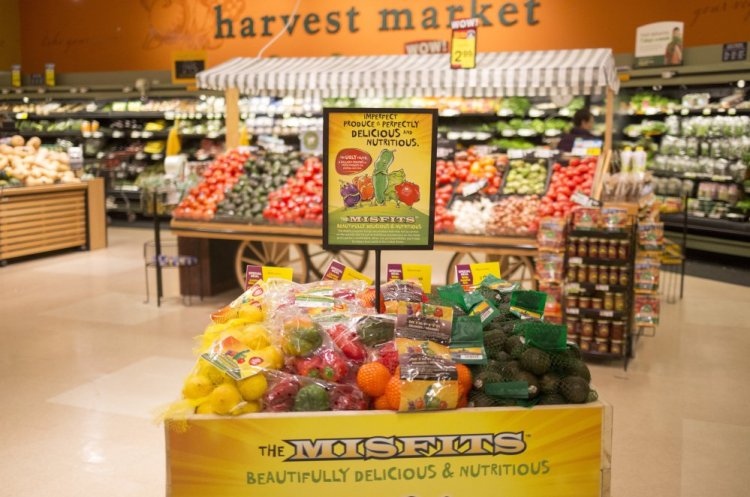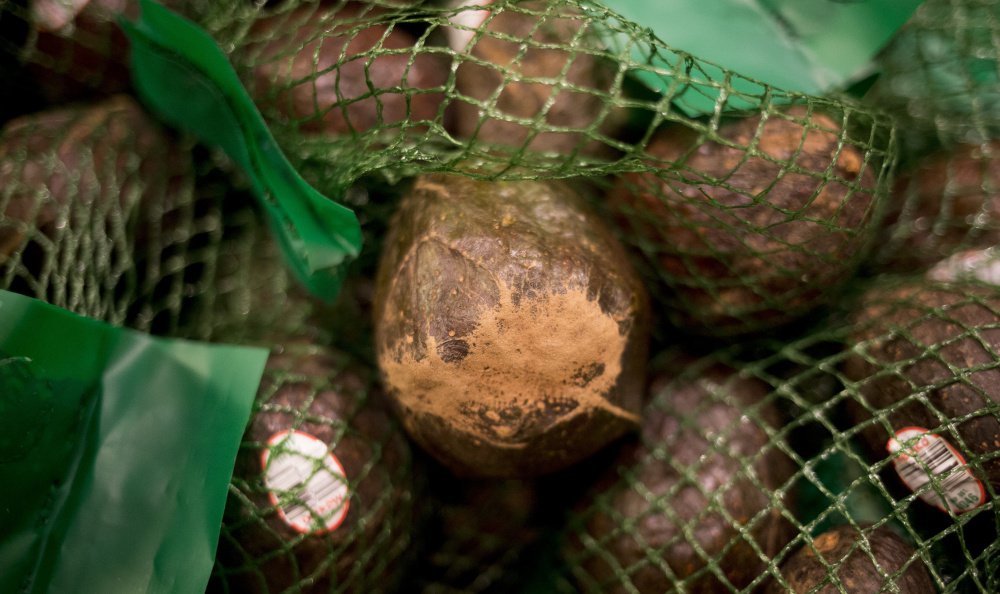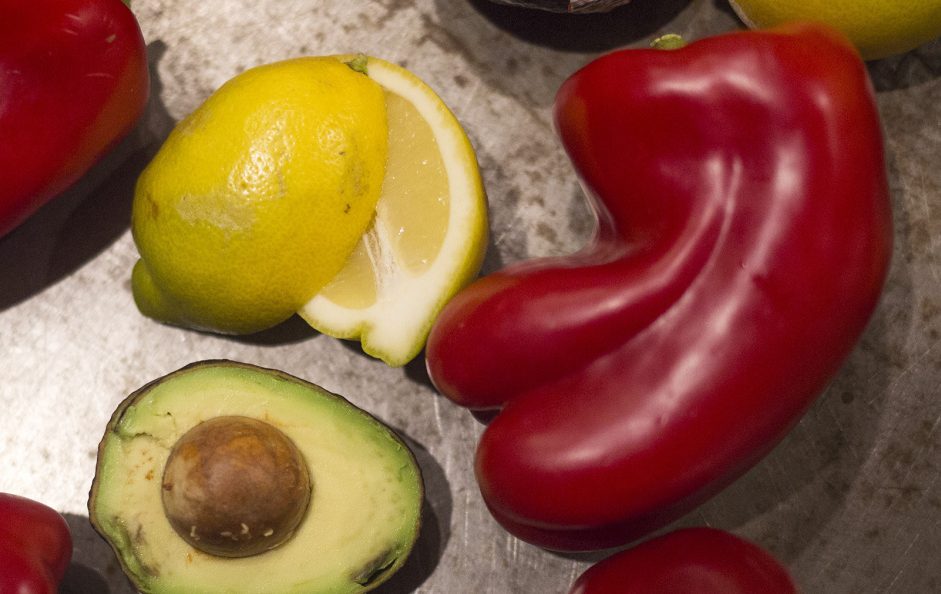YARMOUTH — The red bell pepper was beautiful except for its shape. It sagged in the middle, as if a garden gnome had stepped on it. The avocados and lemons had scars, and the oranges were slightly discolored.
They were not perfect by any means, yet these “misfit” fruits and vegetables were for sale Monday at a nice discount in a special bin at the Hannaford store in Yarmouth. Last week, the supermarket chain launched a program to put irregular-looking produce in 15 stores throughout southern and midcoast Maine, rather than into the waste stream. The produce is just as nutritious and flavorful as the rest of the produce in the store, “it just grew funky,” said Ryan Merone, produce field merchandiser for Hannaford stores in Maine.
“This is stuff that, in the past, never would have made it to supermarket shelves because it doesn’t meet the USDA’s guidelines for either shape or size,” Merone said. “Or maybe there’s color imperfections or scarring on the skin of an avocado, which you don’t eat anyway, but (it) doesn’t look as pretty as what we’ve come to expect on a supermarket shelf. So rather than the farmers getting rid of it, we’ve given them an outlet to now sell it.”
Maine is the second state where Hannaford has rolled out the program. Last year, Merone launched a pilot program in the Albany region of New York, where 14 stores have so far “rescued” more than 100,000 pounds of produce from the compost pile.
According to “The Roadmap,” a 2016 report on reducing food waste from ReFed, a national coalition of more than 30 businesses, nonprofits, government agencies and other organizations, 20 billion pounds of produce is left on U.S. farms every year, mostly for cosmetic reasons.
Rep. Chellie Pingree of Maine, D-1st District, has targeted the elimination of food waste as an important issue, most recently introducing legislation that would fight waste by establishing a uniform national system for date labeling on food products. The legislation also would educate the public about what expiration dates mean, and make it easier for farmers to sell their misfit produce.
Consumers may be more comfortable with the term “ugly produce” today, since misshapen and off-color fruits and vegetables are all over the internet. One popular Twitter account, @UglyFruitAndVeg, encourages its 80,000-plus followers to post photographs of their weird produce. Recent posts include a strawberry shaped like a butterfly and a carrot that resembles a hand, complete with five fingers. The photos, including a butternut squash with a crevice that makes it look like a butt, help the owner of the account, Californian and independent food waste activist Jordan Figueiredo, draw attention to the problem of food waste, hunger and climate change.
In a phone interview, Figueiredo said that consumer awareness of ugly produce is “definitely taking off, particularly the Misfit brand in the U.S. Last year, seven grocers started a full program with ugly produce, and before we only had one grocer.”
Robinson Fresh, one of the largest wholesale produce companies in the country, uses an optical scanner to identify produce that does not meet federal guidelines and packages it under the brand name “Misfit.” This is produce that would ordinarily be disposed of in farm compost or landfills. Robinson markets the produce to big chains, including Hannaford and Hy-Vee, a Midwest chain that is selling Misfit produce in 240 stores.
Ugly produce also is sold directly to consumers by programs such as Hungry Harvest, which ships unsightly fruit and vegetables direct to customers’ doors. And large retailers such as Wal-Mart have dipped a toe into the market, selling ugly apples and potatoes in a handful of stores. But, Figueiredo said, “the real goal is supermarkets, because that’s where most people buy their produce.”
Candace Corey of Yarmouth eyed the avocados in the Misfit display Monday. They were packaged in bags of four and sold for $2.49, or 62 cents each. They were small, she noted, and scarred. The fat, egg-shaped avocados in the regular display just a few feet away had a price of $1.49 each. (Misfit produce is generally up to 30 percent cheaper, Merone said.)
Merone explained to her that, although the avocados were small, the pits are proportionate, so she didn’t need to fear buying mostly pit when she buys Misfit avocados.
Corey, who is used to seeing irregular produce from her own garden, said she had heard of such programs but had never actually purchased any ugly produce.
“I love to see that things are not getting wasted, because it makes me crazy when they throw them out, and there’s nothing wrong with it,” she said.
Merone cut open a scarred lemon for Corey so she could see that it was perfect inside. Misfit lemons were priced at $1.49 per pound – about half the regular cost – and Misfit oranges were marked at $2.49 per 4-pound bag instead of the usual price of $4.99 per 4-pound bag. Misfit bell peppers were $1.49 for three peppers, versus 69 cents for one green bell pepper.
In the end, Corey added the Misfit avocados into her shopping cart and moved on.
Merone said the new program won’t eat into the stores’ donations to local food pantries, since the Misfit produce represents a separate stream of products coming directly from farms that sell to Robinson Fresh. Ugly produce will still find its way into Hannaford stores in other ways – through local farmers, or fruits and veggies that just slip through the cracks – and that will be donated to pantries.
“It’s not that we’re taking the product and selling it instead,” Merone said. “This is just extending those sustainability efforts beyond the stores and back to the farms themselves.”
Besides Yarmouth, Hannaford will be selling Misfit produce at its stores in Belfast, Brunswick, Buxton, Camden, Damariscotta, Gorham, Portland (Forest Avenue and Riverside Street), Rockland, Scarborough, South Portland (Maine Mall and Millcreek), Topsham and Westbrook.
Figueiredo said it’s unclear whether selling ugly produce at large grocery chains will be the answer to ending this type of food waste in the long term.
“A lot of the big ones really have been hesitant to even try it, so we’ll see,” he said. “Hopefully, one day it will just be normalized, where it’s just produce. It’s not ugly or pretty. It’s all produce and some of it looks like this, some of it looks like that. We’re a long way from that.”
Meredith Goad can be contacted at 791-6332 or at:
mgoad@pressherald.com
Send questions/comments to the editors.





